Driving Miss Daisy Blu-ray Movie
HomeDriving Miss Daisy Blu-ray Movie 
Warner Bros. | 1989 | 99 min | Rated PG | Jan 08, 2013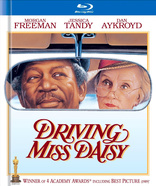
Movie rating
7.3 | / 10 |
Blu-ray rating
| Users | 3.5 | |
| Reviewer | 4.5 | |
| Overall | 3.6 |
Overview
Driving Miss Daisy (1989)
An elderly Jewish widow living in Atlanta can no longer drive. Her son insists she allow him to hire a driver, which in the 1950s meant a black man. She resists any change in her life but, Hoke, the driver is hired by her son. She refuses to allow him to drive her anywhere at first, but Hoke slowly wins her over with his native good graces. The movie is directly taken from a stage play and does show it. It covers over twenty years of the pair's life together as they slowly build a relationship that transcends their differences.
Starring: Morgan Freeman, Jessica Tandy, Dan Aykroyd, Patti LuPone, Esther RolleDirector: Bruce Beresford
| Drama | Uncertain |
| Comedy | Uncertain |
Specifications
Video
Video codec: MPEG-4 AVC
Video resolution: 1080p
Aspect ratio: 1.78:1
Original aspect ratio: 1.85:1
Audio
English: DTS-HD Master Audio 2.0 (48kHz, 24-bit)
Subtitles
English SDH, French, Spanish
Discs
25GB Blu-ray Disc
Single disc (1 BD)
Playback
Region free
Review
Rating summary
| Movie | 5.0 | |
| Video | 4.0 | |
| Audio | 3.0 | |
| Extras | 4.0 | |
| Overall | 4.5 |
Driving Miss Daisy Blu-ray Movie Review
She's Still a Doodle
Reviewed by Michael Reuben January 10, 2013Driving Miss Daisy belongs to that proud line of best picture winners that no one wanted to make and no one saw coming. It began as an off-Broadway drama by playwright Alfred Uhry, who based it on memories of his prickly Jewish grandmother and the African-American chauffeur who drove her for twenty-five years. The play detailing their evolving relationship was hugely successful and won numerous awards, including a Pulitzer Prize for Uhry, but no studio could imagine it as a movie. Who wanted to see a film about two elderly people talking? Producers Richard and Lili Zanuck (Cocoon) immediately grasped how much more there was to Driving Miss Daisy. Uhry, a native of Atlanta, had been determined to write a play about real people, but he also realized that both of his main characters were, in his words, "out of the loop". Even if Jews were not victims of segregation and overt discrimination in the Georgia of the 1940s and 1950s, they were still considered "different". As much as Miss Daisy might like to pretend otherwise, her constant asides about her daughter-in-law's efforts to fit in with the Christian mainstream tell us that she knows where she stands. The triumph of Uhry's play was to present a window into an entire society through the often seemingly trivial interactions of two people divided by race, gender and social status but ultimately united both by their situation as outsiders and by even deeper forces like age and a sense of history. In Uhry's hands, and with the right actors to speak the lines, arguments over maps, speed limits and bathroom breaks became something else: a demonstration of how society may define our relationships, but the truly stubborn among us don't settle for those definitions. For the movie, Uhry reconceived the entire story, with assistance from director Bruce Beresford. The spare, almost abstract staging became a richly realized, fully populated town, where people who only rated a mention in the stage play became characters in their own right, and styles and fashions evolved before the audience's eyes along with the characters' advancing age. Still, the core of the story remained the deepening relationship between Miss Daisy and her long-suffering chauffeur Hoke, a gentleman at heart, who understood the requirements of survival in the Jim Crow south but also knew, with quiet determination, how to get his way.
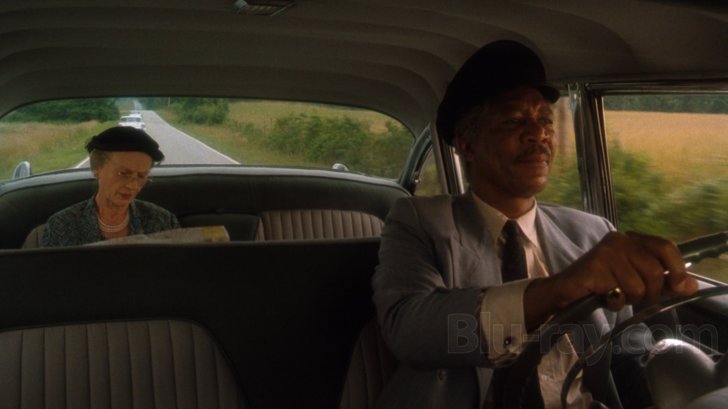
The film opens simply enough with Miss Daisy Werthan (Jessica Tandy, who won an Oscar for her portrayal) wrecking her car in the driveway. Her son, Boulie (Dan Aykroyd, also Oscar nominated), wants her to have a chauffeur, but his mother doesn't want strangers in her life, even though she can no longer get car insurance. A standoff ensues until Boulie hires Hoke Colburn (Morgan Freeman, also Oscar nominated), telling Hoke that Miss Daisy cannot fire him. At first, Miss Daisy refuses to use Hoke's services, leaving him to pass his days sitting in the kitchen with Idella (Esther Rolle), Daisy's cook and housemaid of many years' standing. ("I wouldn't be in your shoes if the Sweet Lord Jesus come down and asked me himself", Idella tells Hoke.) In his own polite way, though, Hoke proves every bit as stubborn as Miss Daisy. After six days—"same time it took the Lord to make the world", Hoke tells Boulie—Miss Daisy Werthan is riding around town in the back seat of her own car, always below the speed limit, just as she prefers. Over the course of a quarter century, Daisy and Hoke experience many things together, some big, some small: afternoons gardening; visits to the cemetery where Daisy tends her husband's grave; reading lessons; private jokes about Boulie's social-climbing wife, Florine (Patti LuPone); a road trip to Mobile, Alabama, for a family function that occasions several memorable encounters, including a run-in with the state police; the death of a mutual acquaintance; a freak ice storm; the bombing of the Atlanta Temple (a real event from 1958); and the civil rights movement led by Martin Luther King, Jr. All of these experiences are filtered through the uniquely nuanced relationship that develops between Hoke and Miss Daisy. Both are proud people with deep feelings. But neither is sentimental. One of the film's special pleasures is the greater role that it allows Boulie Werthan to play in the story. Boulie's steadily improving fortunes and those of Werthan Industries (as it comes to be known) are one of the many markers of both the passage of time and the slowly changing attitudes in the south. The Canadian Aykroyd dons Boulie's southern charm so naturally that he seems to have been born to play the part. The scene in which Boulie accepts an award from the Chamber of Commerce with his mother and beaming wife looking on was written expressly for the film and serves as an effective counterpoint to the discouraging incident of the Temple bombing. It also coordinates perfectly with the funny scene in which Hoke ingeniously negotiates with Boulie for a raise. It doesn't require a trophy from the locals movers and shakers to make a good businessman.
Driving Miss Daisy Blu-ray Movie, Video Quality 
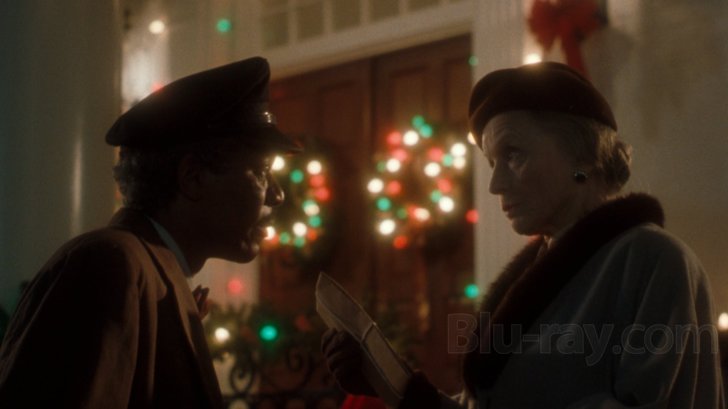
A lovely period sheen has been cast over Driving Miss Daisy by Australian cinematographer Peter James, a regular collaborator with director Beresford. (Their most recent project was the 2010 film, Mao's Last Dancer.) Warner's 1080p, AVC-encoded Blu-ray does not reflect any attempt to brighten or "enhance" the image with boosted contrast, and the blacks are suitably black, which is essential for scenes inside Miss Daisy's home, which James lit from sources outside the windows, so that portions of the frame are often cast in shadow. On a properly calibrated display, there's plenty of detail to be seen in those shadowy areas. Outdoor scenes, and scenes in other locations, are more brightly lit. The grain structure is natural and undisturbed by filtering or other digital tampering. The grain may seem heavy by comparison to contemporary productions, but it is appropriate to both the source and the period. Bright colors occur in Driving Miss Daisy (the Christmas party at Boulie's home is one obvious example), but for the most part the film's palette is as conservative as its heroine. The most notable exceptions are growing things such as flowers, tomatoes and vines. The only flaw to report is minor instability in the image that appears to result from "gate weave" or some similar phenomenon causing the entire frame to shift slightly. It's not a serious problem, but viewers whose eyes were educated by the digital age (and therefore are unused to an image created by film running through a projector) may find it disconcerting. Otherwise, the source material is in excellent shape.
Driving Miss Daisy Blu-ray Movie, Audio Quality 
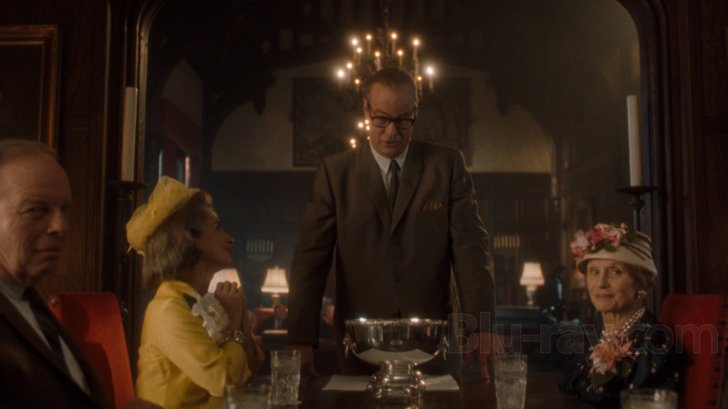
The film's original stereo track is presented in DTS-HD MA 2.0, and it sounds quite good. Driving Miss Daisy may not be a surround showcase, but it features first-rate sound editing to accompany the expansive period environment in which director Beresford has situated his characters. For example, at Hoke's initial job interview, when he and Boulie walk across the factory floor of the Werthan mill, they have to shout over the sound of dozens of looms operating at full speed, and the din is one of many reminders that Boulie runs a thriving business, when he isn't tending to his mama's concerns. Similar bits of narrative information are layered unobtrusively into the soundtrack, and they come through clearly. So does all the dialogue, in accents that author Uhry has vouched for as authentic. Hans Zimmer's sprightly score sounds as good as it ever has.
Driving Miss Daisy Blu-ray Movie, Special Features and Extras 
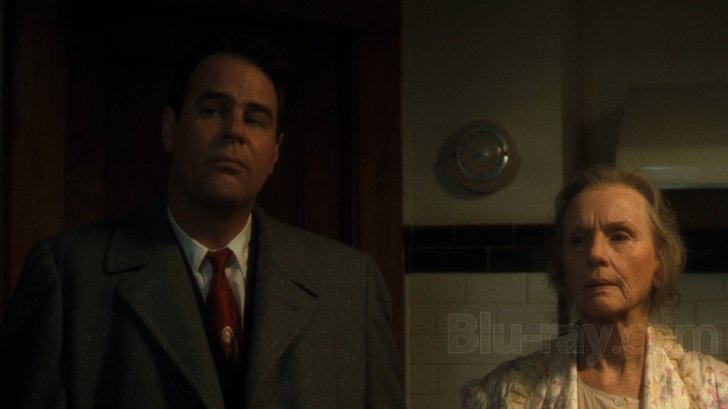
- Things Are Changing: The Worlds of Hoke and Miss Daisy (1080p; 1.78:1; 28:56): This new documentary reflects on the world of Driving Miss Daisy some twenty-three years after the original play opened off-Broadway. As noted by Alfred Uhry, when the documentary was being made, the play was being revived for its first-ever Broadway production (starring Vanessa Redgrave and James Early James, in acclaimed performances). The fascination of the documentary is the participation of so many people with personal connections to the source material. In addition to Uhry and Morgan Freeman, they include: Tom Asher, former president of the Breman Jewish Museum, who, as a child in Atlanta, was cared for by a black chauffeur whom Uhry has listed as one of the models for Hoke; Morocco Coleman, author of Coming Full Circle, and grandson of Will Coleman, chauffeur to Uhry's grandmother and the principal model for Hoke; and Janice Rothschild Blumberg, a historian and member of the Atlanta Jewish community. Also interviewed is Dr. Robert Pratt, a historian at the University of Georgia and author of several books on the history of race relations in the modern south.
- Commentary with Director Bruce Beresford, Screenwriter Alfred Uhry and Producer Lili Fini Zanuck: The three participants were recorded separately, then edited together, although Uhry notes that he will be "joined" by the director and producer. Uhry is by far the most frequent contributor, and he offers substantial background on his grandmother and her chauffeur, who were the models for Miss Daisy and Hoke. Uhry and Beresford are also informative about the various modifications made to reinvent the play as a film, and Zanuck describes the challenges of getting the film financed.
- Miss Daisy's Journey: From Stage to Screen (480i; 1.33:1; 18:36): This detailed featurette serves as a companion piece to the commentary, with Uhry, Beresford and Zanuck (along with producer Richard Zanuck) covering much of the same territory. Of special interest is the participation of make-up artists Lynn Barber and Kevin Haney on the challenges of a film in which the characters age by twenty-five years, and of production designer Bruno Rubeo on the film's period recreation.
- Jessica Tandy: Theater Legend to Screen Star (480i; 1.33:1; 6:43): A tribute to the film's female star, including contributions by Alfred Uhry, Bruce Bereford, Jon Avnet (who directed her in Fried Green Tomatoes) and Tandy's friend and colleague Frances Sternhagen.
- 1989 Vintage Making-Of (480i; 1.33:1; 6:15): An old-style EPK, of which the best parts are the brief contemporary interviews with Tandy and Freeman.
- Theatrical Trailer (480i; 1.78:1, enhanced; 2:20): One of the rare trailers that aptly captures the tone of a film.
- Digibook: Warner has produced a particularly fine illustrated digibook to accompany this release, with biographical sketches of Tandy, Freeman, Aykroyd, Beresford and Uhry, as well as articles about the making of the film and its reception.
Driving Miss Daisy Blu-ray Movie, Overall Score and Recommendation 
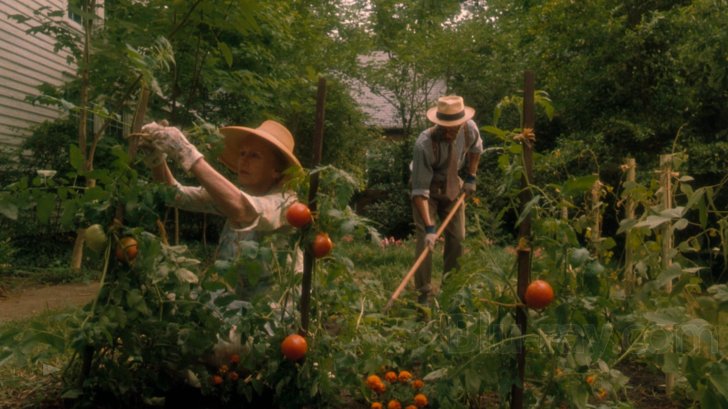
In a famous line near the end of the film (it was used in the trailer, but stop now if you're exceptionally spoiler-allergic), Miss Daisy says to Hoke: "You're my best friend." When you don't know the context (which I won't describe), the line seems more sentimental than it is, but Tandy's delivery adds unexpected depth, because she makes it clear that the thought is something Miss Daisy has just now realized, to her great surprise. In both the play and the film, the line and the exchange that follow are fully earned because of everything that has led up to them. Neither of these two people could change who they were or the world into which they were born. But within those constraints they shared more of life than either they or anyone else ever expected. Highly recommended.
Similar titles
Similar titles you might also like

Mrs. Miniver
1942

Grand Hotel
1932

Gigi
1958

Learning to Drive
2014

Fried Green Tomatoes
1991

The Help
2011

Laggies
2014

Pinky
1949

The Color Purple 4K
1985

Hello, My Name is Doris
2015

Imitation of Life
1934

Mutiny on the Bounty
Warner Archive Collection
1935

The Disappearance of Eleanor Rigby
Includes "Him", "Her", and "Them" Cuts
2014

Same Kind of Different as Me
2017

The Other Woman
2014

Mudbound
2017

Gentleman's Agreement
Fox Studio Classics
1947

The Life Before Her Eyes
2008

The Family That Preys
2008

An American in Paris
1951
